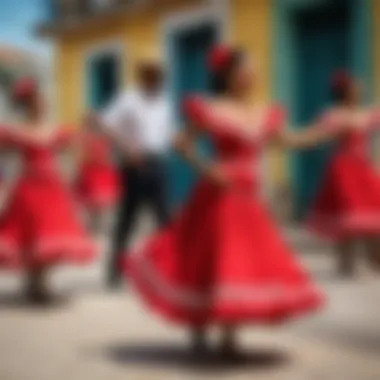Cuban Tours: Insights from Travelers' Reviews


Intro
Cuba is a country of rich culture, vibrant history, and stunning landscapes. Travelers are increasingly drawn to this island nation, seeking diverse tour experiences. This article examines tourist reviews on various Cuban tours, focusing on their insights regarding cultural interactions, logistical challenges, and overall satisfaction. By analyzing these accounts, we can present a nuanced understanding of what to expect when touring Cuba.
We will explore popular destinations, offering unique locations for exotic experiences and comfortable spots for family vacations. Additionally, we will delve into practical preparation tips, including how to choose your itinerary and pack effectively for your trip. This resource aims to equip potential travelers with valuable information to enhance their Cuban tour experience.
Популярные направления
Cuba offers a wide array of touristic opportunities. It is crucial to know the most captivating destinations to enrich your visit.
- Havana: The capital city is a blend of historic charm and modern life. Travelers appreciate its architecture and lively streets. Visitors often comment on the pleasing atmosphere during city tours.
- Varadero: Famous for its beaches, Varadero is a popular choice for relaxation. Families enjoy the clear waters and beautiful sunsets, making it an ideal getaway.
- Trinidad: This UNESCO World Heritage site draws interest for its colonial architecture and cobblestone streets. Tourists highlight the cultural experiences, including music and dance.
"In Trinidad, you can feel the history in every corner. The music resonates, inviting everyone to join in the rhythm of life."
Уникальные направления для экзотических путешествий
Beyond well-known spots, Cuba hosts hidden jewels waiting to be explored. Here are a few suggestions:
- Cayo Coco: Known for its stunning coral reefs, this location is perfect for snorkeling and diving enthusiasts.
- Sierra Maestra: Travelers interested in nature may find hiking in this mountain range rewarding. The landscapes offer breathtaking views and the opportunity to connect with nature.
- Camagüey: This city presents an artistic vibe, with unique pottery and vibrant street art. Visitors can engage with local artisans and participate in workshops.
Комфортные места для семейного отдыха
Family-friendly destinations in Cuba provide a safe and enjoyable experience for all ages. Consider these familiar favorites:
- Guardalavaca: With its calm waters and resorts, this area is ideal for families looking to relax.
- Cayo Santa María: Here, families find all-inclusive resorts offering both fun and convenient amenities.
Подготовка к путешествию
Preparation is key to ensuring a successful trip to Cuba. Understanding how to navigate the logistics can minimize stress.
Советы по выбору маршрута
Choosing the right route can make a big difference. Pay attention to these factors:
- Interests: Identify what interests you the most, be it history, beaches, or culture.
- Duration: Consider how much time you have. Some destinations require more time than others to explore fully.
Как собрать чемодан: полезные советы
Packing wisely ensures that you enjoy every moment of your trip. Keep these tips in mind:
- Clothing: Pack light clothing suitable for warm weather. Include a light jacket for cooler evenings.
- Footwear: Comfortable shoes are essential for walking tours and exploring cities.
This exploration of Cuban tours provides a glimpse into what travelers can expect. Understanding popular destinations, unique locations, and practical preparation tips enhances the overall travel experience. By taking these insights into account, future tourists can navigate Cuba's offerings with confidence.
Cuba: An Overview of Tourism
Tourism is a vital component of Cuba's economy, reflecting the island’s unique appeal. The fusion of rich history, vibrant culture, and stunning landscapes attracts various travelers. Understanding tourism in Cuba involves exploring multiple layers that define the visitor experience.
In this section, we will dissect three fundamental aspects: the allure of the island, tourism's economic significance, and the cultural context. Each plays a crucial role in shaping the experiences of tourists and their overall impression of Cuba.
The Allure of the Island
Cuba's geographical features are striking. The island boasts pristine beaches, lush mountains, and colorful cities. Havana, the capital, epitomizes this charm, showcasing colonial architecture and lively streets. Tourists often mention the rhythm of salsa music and the smell of freshly prepared Cuban cuisine as integral parts of their experience.
"Cuba feels alive in every moment—it's the music, the people, the scenery. It's unlike anywhere else I've been."
—Traveler Review
Beyond aesthetics, Cuba offers a variety of experiences such as scuba diving in Varadero or hiking in Viñales. Each region has its unique characteristics. This diversity keeps travelers engaged and eager to explore more.
Tourism as a Key Economic Driver
Tourism is not just a leisure activity in Cuba; it serves as a significant economic driver. The sector accounts for a sizable portion of the nation's GDP. Many locals depend on travel and hospitality for their livelihoods. Hotels, restaurants, and tour services create employment opportunities that benefit families and communities.


Government initiatives also show a commitment to expanding this sector. Infrastructure enhancements, including the renovation of airports and the improvement of services, indicate a strategic focus on increasing tourist arrivals.
However, it’s worth noting the balance between environmental concerns and economic needs. Sustainable tourism practices are crucial for preserving the island's natural beauty while supporting economic growth. Tourists increasingly seek out eco-friendly options, indicating a shift towards responsible travel.
Understanding the Cuban Culture
Cuban culture is a mosaic, shaped by its diverse history. The influences of African, Spanish, and indigenous peoples create a rich tapestry of traditions, languages, and beliefs. Understanding this context can enhance a traveler's experience.
Interactions with locals are often highlighted by travelers as one of their most rewarding experiences. Engaging in conversations, participating in local activities such as dance classes, or cooking lessons brings travelers closer to the authentic Cuban way of life. It’s essential for visitors to approach these engagements with respect and openness.
Local festivals and events, such as the Havana Jazz Festival, provide unique insights into the culture. Such experiences offer tourists an enriched perspective, fostering a deeper appreciation beyond sightseeing.
Types of Tours Available in Cuba
Understanding the variety of tours available in Cuba is central to grasping the rich landscape of experiences the island offers. The range of tours is designed to cater to different interests, allowing tourists to engage with Cuba's unique charm in a manner that resonates personally. This section will delve deeper into the four primary types of tours available, focusing on their specific elements, benefits, and considerations.
Cultural Tours and Experiences
Cultural tours in Cuba provide visitors with a deep dive into the island's vibrant cultural tapestry. Participants get exposure to music, dance, art, and culinary traditions. Such experiences are vital for understanding Cuba’s history and identity.
A popular aspect of cultural tours includes visits to local music venues or dance schools. Tourists often report enjoying classes in salsa or son, which serve as both entertainment and cultural education. Through engaging directly with local artists and musicians, visitors gain insight into the emotional depth of Cuban culture.
Benefits of cultural tours include:
- Direct engagement with local communities.
- Learning opportunities about Cuban history through art forms.
- Personal connections with locals that enhance the travel experience.
However, tourists should consider their own interest level in cultural activities. Those seeking purely recreational activities might find cultural tours less engaging.
Nature and Eco-Tours
Nature and eco-tours highlight the ecological wonders of Cuba, showcasing its diverse landscapes from valleys to beaches. Such tours provide an excellent opportunity for travelers to appreciate Cuba’s natural beauty while promoting conservation.
Common activities include hiking in the Sierra Maestra mountains or exploring the wetlands of Ciénaga de Zapata. Many travelers have noted that these experiences allow them to connect with nature and understand the importance of preserving these environments.
Key aspects of nature and eco-tours are:
- Sustainable travel practices that minimize environmental impact.
- Opportunities for wildlife observation and photography in untouched areas.
- Educational components that highlight the importance of ecosystems.
Travelers need to prepare appropriately for the physical demands of these tours. Good walking shoes and an understanding of local conditions are essential.
Adventure Tours: Beyond the Ordinary
Adventure tours offer a different angle for those looking for excitement in their Cuban visit. These tours can range from zip-lining through forests to diving in tropical waters, appealing to thrill-seekers.
Adventurous activities allow tourists to explore areas of Cuba that are often overlooked by more traditional tours. For instance, engaging in water sports such as kitesurfing or snorkeling is an excellent way to experience the coast.
Highlights of adventure tours include:
- Unique physical challenges that create memorable experiences.
- An opportunity to explore lesser-known attractions, often with small tour groups.
- Experiencing Cuba from a different perspective, such as underwater or from above.
Adventure tours also demand a good level of fitness; thus, travelers should realistically assess their capabilities when considering participation.
Historical Tours: A Journey Through Time
Cuba boasts a rich and complex history evident in its architecture and historical sites. Historical tours guide tourists through significant landmarks and cities, providing context to the island's past.
Experiencing Havana's Colonial architecture or visiting revolutionary sites can offer profound insights into the events that shaped modern Cuba. Many past travelers have noted how these tours foster a greater appreciation for the physical and cultural remnants of history.
Key benefits of historical tours include:
- In-depth knowledge from knowledgeable guides.
- A chance to see preserved sites, which often are UNESCO World Heritage sites.
- Opportunities to engage with history through storytelling and artifacts.


Historical tours can be intellectually engaging, but visitors should also be prepared for the slower pace and potential for extensive walking.
In sum, choosing the right type of tour is essential for an enriching experience in Cuba. Each category presents unique advantages and requires upfront knowledge of personal interests and physical readiness. Understanding these considerations can significantly enhance the satisfaction level for travelers seeking to discover Cuba.
Tourist Reviews: What Travelers Are Saying
Understanding tourist reviews is crucial for potential visitors to Cuba. These reviews provide a wealth of knowledge, offering firsthand accounts of what to expect from different tours and experiences. Travelers share their insights on the overall quality, cultural interactions, and logistical aspects of their journeys, allowing newcomers to make informed decisions. By analyzing these reviews, future tourists can identify both the appealing features and potential pitfalls of Cuban tours.
General Satisfaction Levels
Most travelers report overall satisfaction with their experiences in Cuba. Many praise the warmth of the locals and the beauty of the landscapes. A common theme in reviews is the impact of personal interactions with the Cuban people, which often enrich the travel experience. However, satisfaction levels can vary significantly depending on the type of tour and the specific tour operator. Reports indicate that organized group tours tend to score higher on satisfaction than independent travel, chiefly because of the ease of logistics and the quality of guidance provided.
Positive Experiences and Highlights
Travelers frequently highlight several positive aspects of their Cuban tours:
- Cultural Immersion: Many reviews commend the opportunity for authentic cultural experiences, such as participating in local festivals or visiting artisan workshops. These interactions create memorable connections that linger long after the trip.
- Scenic Beauty: The stunning landscapes, from the beaches of Varadero to the mountains of Viñales, receive high praise. Travelers often express awe at the natural beauty, which adds depth to the tours.
- Gastronomy: The culinary experience is another highlight. Reviewers mention savoring traditional dishes like Ropa Vieja and enjoying fresh tropical fruits. These culinary delights leave a lasting impression, enhancing the overall experience.
"The cooking class was a delightful surprise. It was a true taste of Cuba!"
Despite general satisfaction, not all experiences are positive.
Common Complaints and Issues
While many travelers share positive accounts, reviews also reveal common complaints:
- Infrastructure Challenges: Connectivity and transportation can pose issues. Some reviewers mention that roads are in poor condition, making travel times longer than expected.
- Service Inconsistencies: Reports of inconsistent service quality are common. While many tour guides are highly praised for their knowledge and dedication, others may lack professionalism, leading to disappointment.
- Tour Limits: Some travelers feel that tours can be overly scripted, limiting genuine engagement with local culture. They express a desire for more flexibility to explore on their own during the tours.
In summary, analyzing tourist reviews allows potential visitors to Cuba to prepare adequately. Understanding satisfaction levels, positive experiences, and common complaints provides balanced insights that can help travelers make better choices.
Navigating Cuban Tours: Tips and Recommendations
Understanding how to navigate the various tour options in Cuba is critical for prospective travelers. Cuba offers a diverse range of tours, each providing unique experiences. This section aims to equip travelers with essential tips and recommendations. It addresses critical elements such as choosing the appropriate tour, budgeting effectively, and planning logistics. Making informed decisions can enhance the overall travel experience.
Choosing the Right Tour for You
Selecting the right tour in Cuba begins with assessing personal interests. Some may prioritize cultural immersion, while others might prefer nature-oriented trips. It is vital to research different types of tours available, such as those focusing on history or adventure. Consider the following aspects:
- Tour Themes: Identify what aspects of Cuba you want to explore, whether it's the vibrant cities, lush landscapes, or historical sites.
- Duration: Check how long the tour lasts and if it fits into your schedule. Some tours may be half-day experiences, while others could span several days.
- Group Size: Determine if you prefer a small group for a more intimate experience or a larger group for social interaction.
Before booking, read reviews from other travelers. Websites and forums often provide valuable insights into guides, itineraries, and overall satisfaction.
Understanding Costs and Budgeting
Cuba can be an affordable destination, but costs can vary widely depending on the type of tour and services offered. Proper budgeting is essential to avoid overspending while ensuring you make the most of your visit. Consider these budgeting tips:
- Tour Packages: Compare prices for different tour packages. Some offer all-inclusive options, while others charge separately for meals and activities.
- Hidden Fees: Be aware of potential hidden fees, such as entrance fees to attractions and tips for guides.
- Local Currency: Understand the currency exchange rates. Familiarize yourself with both the Cuban peso and convertible peso to budget accurately.
Planning for unexpected expenses is also wise. Having some extra cash on hand can alleviate stress during your travels.
Booking Logistics: When and How
The booking process for tours in Cuba requires some forethought. Knowing when to book can significantly affect your trip's quality. Here are some practical logistics:
- Advance Booking: It is often advisable to book tours in advance, particularly during peak travel seasons. This prevents last-minute disappointments.
- Reputable Tour Operators: Choose established operators known for quality experiences. Many travelers recommend checking platforms such as Reddit or trip advisor for recommendations.
- Cancellation Policies: Understand the cancellation policies of the tour operators to avoid penalties if plans change.
Cultural Etiquette and Interaction
Understanding cultural etiquette is crucial when traveling to Cuba. Engaging with locals not only enhances the travel experience but also fosters mutual respect and understanding. Cuba's society is a blend of various influences, making it rich in customs and traditions. Tourists who navigate these cultural waters with sensitivity are likely to have a more immersive experience. Positive interactions with locals can lead to deeper insights into the Cuban way of life and can significantly affect the overall satisfaction of one’s visit.
Equally important is the understanding that cultural interactions are not a one-way street. Travelers should consider how their actions and attitudes are perceived. Respecting local customs can open doors and create a welcoming atmosphere. Thus, being aware of cultural nuances can elevate the travel experience significantly.


Engaging with Locals: Do's and Don'ts
Engaging with locals is an essential aspect of experiencing Cuba. Here are some practical do’s and don’ts to consider:
Do's:
- Smile and Greet: A warm smile and a friendly greeting in Spanish, like "Hola," can go a long way.
- Ask Questions: Cubans are often eager to share their stories and experiences. Asking about their daily lives shows interest and respect.
- Accept Invitations: If locals offer you a drink or a meal, consider accepting. This can be a way to connect and learn more about the culture.
- Use Basic Spanish: Knowing a few phrases can help break the ice and show respect for the language and culture.
Don'ts:
- Avoid Sensitive Topics: Steer clear of political discussions or comments that may be seen as disrespectful.
- Don't Assume: Not every Cuban shares the same views or experiences. Avoid making blanket statements about the culture.
- Avoid Feeling Entitled: Interact with locals with humility, and do not expect special treatment.
Engaging with local Cubans can transform a typical tour into a personal journey filled with insight and connection.
Respecting Cuban Traditions
Respecting Cuban traditions is essential for fostering goodwill. The island has a rich tapestry of customs influenced by African, Spanish, and indigenous cultures. Here are some key considerations:
- Understand the Value of Family: Family is central to Cuban life. Many Cubans take pride in their family histories, so showing interest in these can help build rapport.
- Participate in Local Festivities: If possible, joining in on local festivals can provide a deeper understanding of the culture and traditions. This can lead to enjoyable interactions with locals participating in the events.
- Acknowledge Cultural Symbols: Familiarizing oneself with local traditions, symbols, and practices shows respect and appreciation. For example, the significance of music and dance in Cuban culture cannot be overstated.
Respecting these aspects of culture enriches the travel experience greatly. Travelers who approach their journey with open minds and respect for local customs will find that their interactions become more rewarding.
Post-Tour Reflections: What Remains
The period following a trip can be just as pivotal as the journey itself. Post-tour reflections serve as a means to consolidate experiences and assess the impact of the travels on the individual's worldview. They fortify the emotional resonance of the journey, allowing tourists to articulate their feelings and observations about Cuba. This stage is crucial because it provides clarity about what was learned, experienced, or perhaps even what expectations were not met.
Understanding the lasting impressions of a destination like Cuba can significantly affect future travel and planning. Tourists may find that their views on the culture, cuisine, or interactions with locals alter fundamentally after their experiences. These reflections not only encompass personal feelings but also shape the expectations of other potential travelers.
Lasting Impressions of Cuba
Cuba leaves a deep imprint on those who visit. Many travelers describe a mixture of enchantment and melancholy. The vibrant streets of Havana, with their colonial architecture, lively music, and sincere locals, create fond memories. The warmth of the Cuban spirit often surprises visitors, leading to meaningful connections that linger long after the trip.
Travelers frequently mention the contrast between the country's rich cultural heritage and the challenges that its economic situation presents. For some, the improvisation necessary to navigate daily life in Cuba becomes a powerful symbol of resilience.
- Travelers often share a newfound appreciation for the complexities of local life.
- Some express regret not having engaged more deeply with the community.
- Others highlight the beauty of the sunsets and the rhythm of the music that seem to resonate with their souls.
In essence, lasting impressions often encompass a blend of admiration for the beauty and struggle of Cuban life. They become stories that shape a person's narrative and perspective.
The Influence of Travel on Perspective
Travel is widely acknowledged as a transformative experience. The insights gained from one’s journey can alter perceptions and understanding of both oneself and the world at large. In the case of tours in Cuba, the influence is profound. Visitors often return with expanded horizons.
The experience of engaging with diverse cultures, such as Cuba's, can lead to significant personal growth. Learning about the histories, struggles, and triumphs of a different people develops empathy and a deeper understanding of global contexts.
Some themes that emerge from this influence include:
- Cultural Appreciation: Many travelers report an enriched perspective on Latin American culture, which often contrasts sharply with their own.
- Insight into Economic Challenges: Experiencing the socio-economic conditions firsthand fosters a greater awareness of global inequities.
- Self-Reflection: The contrast between one’s own life and that of Cubans prompts reflection on personal values and priorities.
Travel, particularly in a nuanced environment like Cuba, encourages introspection and continuous personal development. Each traveler’s narrative contributes to a composite understanding of a nation characterized by complexity, joy, and challenge.
The End: The Future of Tourism in Cuba
The conclusion serves to encapsulate the insights gleaned from tourist experiences while framing the discussion around the future landscape of tourism in Cuba. A significant focal point is the increasing importance of sustainable practices in tourism. As global travelers become more environmentally conscious, Cuba faces the challenge of balancing tourist demands with ecological preservation. This is crucial not only for maintaining the island's natural beauty but also for ensuring that future generations can enjoy its rich cultural and natural resources.
Sustainable Practices Moving Forward
Moving forward, Cuba must adopt sustainable tourism practices to cater to an informed traveler base. These practices include minimizing environmental impacts through better waste management, promoting responsible tourism, and prioritizing eco-friendly transportation options. Tour operators can implement guidelines that educate visitors on the significance of protecting local ecosystems.
Additionally, local community engagement is vital. Involving residents in tourism initiatives can enhance the visitor experience while promoting cultural preservation. Visitors who interact meaningfully with locals often leave with a deeper appreciation for Cuba's heritage.
Evolving Tourist Expectations
The expectations of tourists are changing. Today's travelers seek authentic experiences, unique cultural engagements, and ethical considerations in their travel choices. Cuban tourism must evolve to meet these demands. Tour operators should focus on creating tours that offer genuine interactions with local heritage, ensuring that experiences resonate more deeply.
This shift may include expanding culinary tours that showcase traditional Cuban cuisine or immersing tourists in community workshops that highlight local crafts. As experiences take precedence over mere sightseeing, future Cuba tour offerings must align with this trend to remain relevant.
Tourism in Cuba is at a crossroads. By prioritizing sustainability and adapting to the evolving preferences of travelers, the island can foster a tourist environment that respects its rich culture and environment. As Cuba continues to welcome visitors, the future of its tourism will hinge on this delicate balance.







